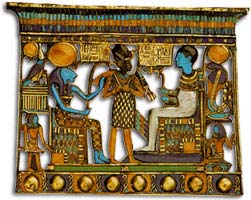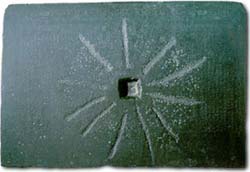
the Triad of Memphis
Memphis, "White Walls", was the first capital of Egypt following its unification by the pharaoh Menes. In the area around Memphis, at sites such as Saqqara and Dahshur, pharaohs and important officials were entombed over many centuries.
During the Greco-Roman period, Memphis lost much of its importance to Alexandria. With the Edict of Theodosius I (AD 379-95), Christianity was established as the official religion of the Roman Empire. The sites in and around Memphis became quarries for building projects in Cairo and the Temple of Ptah was destroyed. Thus, most of the information about the Memphite religious beliefs have been lost.

Most of what we know comes from the Shabaka Stone (seen at left). This stone commissioned by Pharaoh Shabaka when he found that the only written information of the Memphite beliefs was found on a worm-ridden piece of papyrus. He ordered that the papyrus be carved onto a stone so that its knowledge and information may last for all time. Unfortunately, since its original creation the Shabaka Stone was used as a millstone to grind grain and so some of the passages are no longer clear.
The people of Memphis believed that their god Ptah was the most ancient and pre-eminent of all the gods. Ptah was seen as the creator of all the other gods, the sun, and was responsible for the ripening of vegetation. The gods of Heliopolis were considered to be just forms or manifestations of Ptah. He was called the "heart and tongue" of the Ennead. To the Egyptians, the heart and tongue were the seat of the human soul and intellect. Ptah was said to be superior to Atum who created his Ennead "by his semen and his fingers".
Ptah was more than just the creator of the physical world, he also created the spiritual world. He created the ka of each being. He was the creator of all good things, such as food, drink and the offerings of the gods. Ptah also created political order in the world by founding the cities and nomes of Egypt.
Sekhmet was Ptah's primary consort and his son was either Nefertem or Imhotep.
the Family Tree
| Ptah | Sekhmet | |
| Nefertem |
Digg This!
![]() Del.icio.us
Del.icio.us
![]() Stumble Upon
Stumble Upon
